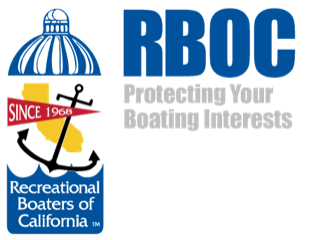RBOC is working to protect boater fuel tax dollars and registration fees from a proposal to target these funds for the cleanup of abandoned commercial vessels.
RBOC is opposing AB 2092 [Frazier] unless the bill is amended so that recreational boaters’ funds will not be used to rid the waterways of abandoned commercial vessels.
RBOC is greatly concerned that, as currently written, AB 2092 would open up the use of boater fuel tax dollars and registration fees for commercial vessels. The key issues:
- Commercial vessels are much more expensive to clean-up and the cost of one vessel could exceed the entire fund.
- The owners of commercial vessels do not contribute to the fund –only recreational vessel owners do.
- The demand for clean-up of recreational vessels already exceeds the amount of available funds. These vessels should remain the topaat this time.
- There have been no comprehensive studies of:
- The extent to which abandoned commercial vessels represent danger on the waterways;
- Whether the owners of abandoned commercial vessels can be identified and assessed cleanup costs; and
- Whether there are other alternatives to tapping into the recreational boater-funded program, such as state recycle and superfund dollars.
AB 2092 proposes to open up the use of boater-generated fuel tax dollars and registration fees for the cleanup of abandoned commercial vessels. At issue is the integrity of the boater supported and financed Abandoned Watercraft Abatement Fund [AWAF] and Vessel Turn-in Program [VTIP]. RBOC has been – and continues to be - a strong supporter of both of these essential programs.
The AWAF and VTIP provide funds to public agencies to remove, store, and dispose of abandoned, wrecked, or dismantled recreational vessels which pose a substantial hazard to navigation, from navigable waterways or adjacent public property, or private property with the landowner's consent.
As part of its commitment to provide clean, safe and enjoyable recreational boating on California's waterways, the Division of Boating and Waterways [DBW] administers this statewide program. It allows public local agencies to apply for funding and upon approval, enter into a contract grant agreement with DBW.
The AWAF and VTIP, enacted in 1998 and 2010 respectively, have provided millions of dollars in grants, and have enabled the removal of thousands of vessels and other marine debris.
The Governor has proposed a budget of $1.75 million for the program in next year’s budget, and we understand that the monetary requests of grant applicants greatly exceed the available funds.
As RBOC has discussed with the author and proponents of the measure, rather than focus on recreational boaters’ funds, RBOC would be pleased to work with all interested stakeholders to address the issues raised by the abandonment of commercial vessels in California, and to identify effective, efficient, and balanced efforts that can be taken.
RBOC continues to be engaged in the productive dialogue that occurs within the abandoned vessel working group that focuses on these issues and can provide a beneficial forum for the development of ideas.
Other state and local agencies that have financial resources and expertise should also be approached. CalRecycle, for instance, completed a department-managed Pilot Project a few years ago with the stated objective of removing abandoned commercial vessels and debris that poses threats to the Sacramento-San Joaquin Delta.
There is a CalRecycle Solid Waste Cleanup Trust Fund and a State Water Resources Control Board Cleanup and Abatement Account.
